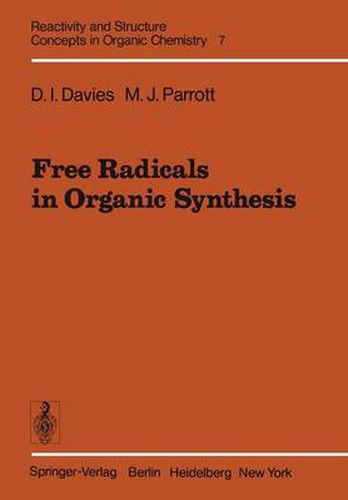Free Radicals in Organic Synthesis
D. I. Davies,M. J. Parrott

Free Radicals in Organic Synthesis
D. I. Davies,M. J. Parrott
This title is printed to order. This book may have been self-published. If so, we cannot guarantee the quality of the content. In the main most books will have gone through the editing process however some may not. We therefore suggest that you be aware of this before ordering this book. If in doubt check either the author or publisher’s details as we are unable to accept any returns unless they are faulty. Please contact us if you have any questions.
Free Radical Chemistry has a comparatively long history. Before the accep- tance of the quadrivalence of carbon, various attempts were made to prepare trivalent carbon species like methyl and ethyl. Initial investigations involving reaction between alkyl iodides and zinc were thought to be successful \ but were subsequently branded as failures 2. In fact free methyl and ethyl were transient radicals involved in the reactions, but because of their short lifetimes the radicals were not detected, and only the hydrocarbons formed by dimeri- th sation of the radicals were isolated. At the beginning of the 20 century Gom- berg discovered the stable triarylmethyl radicals 3, and then in the 1920’s Pa- neth 4 showed that free alkyl radicals could have a short lifetime in the gas phase. Free radicals as intermediates in reactions in solution were largely un- recognised until in 1937 Hey and Waters 5 interpreted a number of reactions, which did not fit into the then developing electronic theory of Organic Chem- istry6,7, by suggesting that they involved the intermediacy of free radicals. The other contemporary pioneer Kharasch 8 also proposed free radicals as interme- diates in certain reactions in solution, many involving organometallic species. However in the 1930 - 1950 period free radicals were not universally accepted as respectable reaction intermediates as evidenced by the initial rejection of the work of Koelsch 9 and the stand against free radicals made by Hodgson 10.
This item is not currently in-stock. It can be ordered online and is expected to ship in 7-14 days
Our stock data is updated periodically, and availability may change throughout the day for in-demand items. Please call the relevant shop for the most current stock information. Prices are subject to change without notice.
Sign in or become a Readings Member to add this title to a wishlist.


